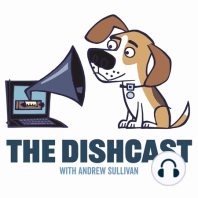105 min listen

Nick Miroff On The Border Crisis
Nick Miroff On The Border Crisis
ratings:
Length:
80 minutes
Released:
Apr 9, 2021
Format:
Podcast episode
Description
Nick is the supremely talented reporter at the Washington Post covering immigration and DHS, and before that he was a foreign correspondent based in Mexico City and Havana. We tried to break down what is actually happening on the Southern border, and how likely it is to get exponentially worse.You can listen to the episode right away in the audio player embedded above, or right below it you can click “Listen in podcast app” — which will connect you to the Dishcast feed. To hear three excerpts from my conversation with Nick — on how the U.S. got to “kids in cages” under Trump; on the cruelty of letting in migrants without any support; and how basically no one who enters the U.S. illegally gets deported — head over to our YouTube page. Here is the full long dissent from our main post today:I think you’re becoming a curmudgeon. In your episode with Emily Yoffe and your post on “queer”, you negate any possibility of conceiving of a group of people who are either L, or G, or B, or T, or any of the other sometimes-associated letters. The notion that this group is nonexistent is silly. Here are the characteristics common to the people you want to say have nothing in common:We don’t conform to the expectations today’s culture has for persons of our gender, whatever that may be. Men aren’t supposed to be attracted to men. Women aren’t supposed to be attracted to women. No one is supposed to be attracted to more than one gender. Everyone is supposed to feel like the gender of their biological sex. I first heard this described as “gender-nonconformity” by — guess who? — a gay man. Because of the above, or for other reasons, we experience mental and emotional issues at higher rates than the general population. Maybe we’ve experienced homophobia by others. Worse, most of us have experienced homophobia or transphobia from ourselves. Our childhoods were generally marked by stresses due to our nonconformity that other children didn’t experience. Many of us have to make a life’s work of reaffirming our own worth in spite of the fact that we’re different from most of the culture. We can each potentially find support from other non-conforming individuals, even if they are different from the general culture in different ways than we are. I could think of others, but that’s enough for now. If a group can be said to be a collection of individuals that share common characteristics, of course there’s a group here. So there must be a word of some kind for it. Sure, raise the alarm against CRT if you want. Fine. Personally, I think this also speaks to your own experience more than logic. You (understandably) like the idea of the community that gay men represent to you, so don’t muddy the waters by broadening the group. It’s meant something to you to have that community. But this is both/and. It’s true that the community of gay men, or even the individual experience of gay men, is not the same as other communities. I know that as a bisexual man. Polls indicate that the numbers of bisexuals is higher than the numbers of either lesbians or gay men. And we commonly report that we feel both that we are like and unlike lesbians and gay men. That’s been my experience—gay/not-gay, but most certainly not straight.I do agree with you that straight people should not identify with groups they don’t belong in. It’s trendy to be “queer,” but it’s insincere signaling. But what I’d like to know, Andrew, is what word you’d allow me to use to describe broadly the group I belong in, beyond just bisexual (a word that carries an awful lot of stigma)? I used to say “LGBT” or “LGBTQ,” but now I’m to understand that those aren’t available for use. And God forbid I call myself “queer.” Learning from other “rainbow people” has helped me learn about myself. Being supported by them, and supporting them, has helped me heal. So I do identify as [Andrew-approved word]. Can you please help me out here? This is a great question. I’ll think some more on it, but here’s my instant thoug
Released:
Apr 9, 2021
Format:
Podcast episode
Titles in the series (100)
Sam Harris On Trump's Incurable Character, Biden's Flaws and Virtues, The Toll Of Wokeness, And How A Landslide Could Heal Us by The Dishcast with Andrew Sullivan